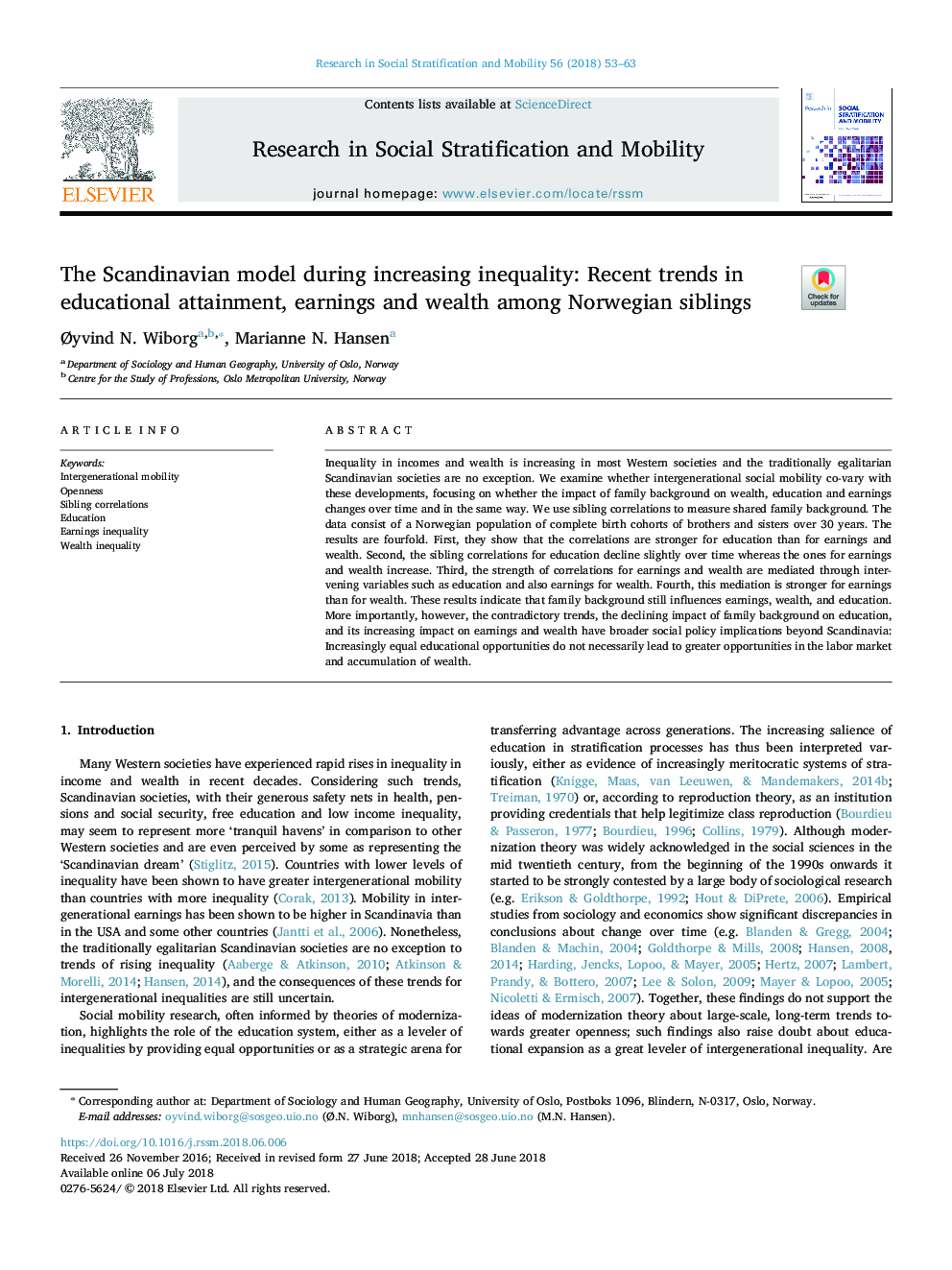| کد مقاله | کد نشریه | سال انتشار | مقاله انگلیسی | نسخه تمام متن |
|---|---|---|---|---|
| 7409838 | 1481556 | 2018 | 11 صفحه PDF | دانلود رایگان |
عنوان انگلیسی مقاله ISI
The Scandinavian model during increasing inequality: Recent trends in educational attainment, earnings and wealth among Norwegian siblings
ترجمه فارسی عنوان
مدل اسکاندیناوی در افزایش نابرابری: روند اخیر در میزان تحصیلات، درآمد و ثروت خواهران و برادران نروژی
دانلود مقاله + سفارش ترجمه
دانلود مقاله ISI انگلیسی
رایگان برای ایرانیان
کلمات کلیدی
تحرک بین نسلی، باز بودن، همبستگی همبستگی، تحصیلات، نابرابری درآمد، نابرابری ثروت،
ترجمه چکیده
در بیشتر جوامع غربی نابرابری در درآمد و ثروت در حال افزایش است و جوامع اسکاندیناوی به طور سنتی مقتدرانه هیچ استثنائی ندارند. ما بررسی می کنیم که آیا تحرک اجتماعی بین نسلی با این تحولات همخوانی دارد یا خیر، با توجه به این که آیا تأثیر پس زمینه خانواده بر ثروت، تحصیلات و درآمد در طول زمان و به همین شکل تغییر می کند. ما از همبستگی خواهر و برادر برای اندازه گیری زمینه مشترک خانواده استفاده می کنیم. داده ها شامل جمعیت نروژی از همسران کامل تولد برادران و خواهران بیش از 30 سال است. نتایج چهار برابر شده است. اولا، آنها نشان می دهند که همبستگی برای تحصیلات قوی تر از درآمد و ثروت است. دوم، همبستگی مادربزرگ برای تحصیلات در طول زمان کمی کاهش می یابد در حالیکه آنهایی که برای درآمد و ثروت افزایش می یابند. سوم، قدرت همبستگی برای درآمد و ثروت از طریق متغیرهای مداخله ای نظیر آموزش و همچنین درآمد برای ثروت، متاثر می شود. چهارم، این واسطه برای درآمد بیشتر از ثروت است. این نتایج نشان می دهد که پس زمینه خانواده هنوز بر درآمد، ثروت و آموزش تاثیر می گذارد. مهمتر از همه، گرایش های متناقض، تأثیر منفی پس زمینه خانواده بر آموزش و تأثیر آن بر درآمد و ثروت، پیامدهای سیاست های اجتماعی گسترده ای را فراتر از اسکاندیناوی می دانند: فرصت های بیشتری برای تحصیلات لزوما منجر به فرصت های بیشتر در بازار کار و انباشت ثروت.
موضوعات مرتبط
علوم انسانی و اجتماعی
اقتصاد، اقتصادسنجی و امور مالی
اقتصاد، اقتصادسنجی و مالیه (عمومی)
چکیده انگلیسی
Inequality in incomes and wealth is increasing in most Western societies and the traditionally egalitarian Scandinavian societies are no exception. We examine whether intergenerational social mobility co-vary with these developments, focusing on whether the impact of family background on wealth, education and earnings changes over time and in the same way. We use sibling correlations to measure shared family background. The data consist of a Norwegian population of complete birth cohorts of brothers and sisters over 30 years. The results are fourfold. First, they show that the correlations are stronger for education than for earnings and wealth. Second, the sibling correlations for education decline slightly over time whereas the ones for earnings and wealth increase. Third, the strength of correlations for earnings and wealth are mediated through intervening variables such as education and also earnings for wealth. Fourth, this mediation is stronger for earnings than for wealth. These results indicate that family background still influences earnings, wealth, and education. More importantly, however, the contradictory trends, the declining impact of family background on education, and its increasing impact on earnings and wealth have broader social policy implications beyond Scandinavia: Increasingly equal educational opportunities do not necessarily lead to greater opportunities in the labor market and accumulation of wealth.
ناشر
Database: Elsevier - ScienceDirect (ساینس دایرکت)
Journal: Research in Social Stratification and Mobility - Volume 56, August 2018, Pages 53-63
Journal: Research in Social Stratification and Mobility - Volume 56, August 2018, Pages 53-63
نویسندگان
Ãyvind N. Wiborg, Marianne N. Hansen,
